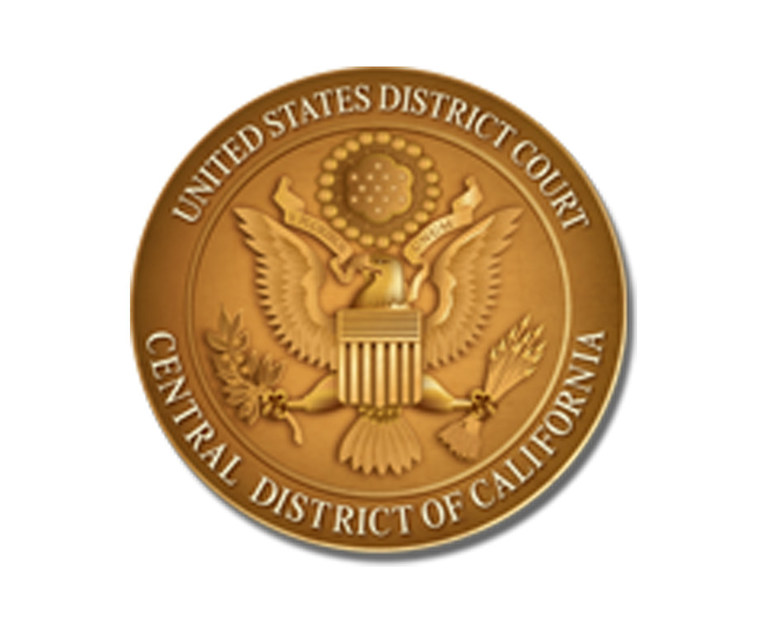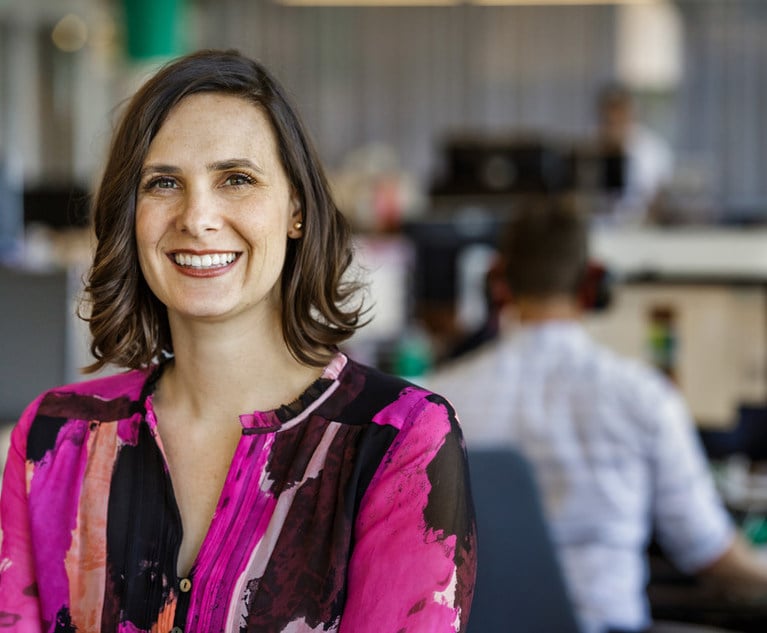As Judge Urges Outcry From Civil Bar, Central District Extends COVID-19 Jury Trial Ban
Dozens of cases will be delayed because of the ban, from major criminal cases to years-old lawsuits.
January 18, 2022 at 06:46 PM
5 minute read
 U.S. District Court for the Central District of California seal. Courtesy photos
U.S. District Court for the Central District of California seal. Courtesy photos
The Central District of California is extending its COVID-19-related ban on jury trials through Feb. 28, a judge said Tuesday.
"We're going to lose our Feb. 1 trial date, unfortunately," U.S. District Judge Cormac J. Carney told civil attorneys in his courtroom for a 1:30 p.m. status conference in a copyright lawsuit against rapper Cardi B, saying he'd heard the news about five minutes ago.
Carney said the judges on the Central District's executive committee voted to extend the suspension. The committee on Jan. 3 suspended trials through Jan. 24, with an announcement from the clerk's office citing "an alarming surge in COVID nationwide and in the Central District of California."
Meanwhile, the Northern District of California hasn't yet extended its suspension of trials, currently in place through Jan. 26.
Carney on Tuesday implored the civil attorneys to do more to object to trial suspensions, saying, "The civil bar has been, quite frankly, silent during all of this." While the Speedy Trial Act only governs criminal cases, Carney said civil attorneys could invoke the Seventh Amendment, which guarantees a right to a jury trial.
"Conducting a civil trial is so much easier than conducting a jury trial because you don't have to have as many people," Carney said. But "I haven't seen a big movement in the civil bar, quite frankly, about these delays and this backlog. It's unfortunate."
A. Barry Cappello of Cappello & Noel in Santa Barbara responded, "Well, you can understand why, can't you?"
Cappello, who with Lawrence J. Conlan represents the plaintiff who's suing Cardi B, said the bar is divided between plaintiffs and defense attorneys, and the defense "generally, generally, as a general rule, would rather not go to trial for a variety of reasons, particularly if insurance is involved."
"So the bar is divided," Cappello said.
Carney said the bar "may be divided, but the plaintiffs bar in the civil area is a very powerful lobby."
Cappello said the lobby is sometimes "so political."
Carney agreed.
"Sometimes, particularly in California, they're aligned with those that are more cautious," the judge said.
The judge said he'd try to reschedule the Feb. 1 trial before the end of the summer. Cappello winced.
"Do your best, please, your honor. This case has been around for so long," Cappello said.
"Mr. Cappello, you're singing to the choir," Carney replied.
"We know your record in trying to get matters to trial during the pandemic, and we deeply appreciate it," Cappello said.
Cappello was referring to Carney's dismissal of four criminal cases under the Speedy Trial Act during he Central District's initial 14-month trial suspension from March 2020 to June 2021.
The U.S. Court of Appeals for the Ninth Circuit overturned Carney's first dismissal in April, saying the judge dismissed the case not for lawful purposes but to try to force his bench colleagues to relent on their trial ban. The Ninth Circuit then on Jan. 6 rejected an en banc review request in a split vote that included two concurrences and a dissent. Federal defenders are planning to file a cert petition with the U.S. Supreme Court.
Along with the Cardi B case, dozens of other cases have been affected by Central District's new trial suspension, including a multi-defendant gang and RICO criminal case that was to begin trial this month before U.S. District Judge Andre Birotte.
Trial is scheduled to begin Feb. 22 before U.S. District Judge John Walter in a lawsuit Kobe Bryant's widow Vanessa Bryant brought against the Los Angeles County Sheriff's Department for illicit death scene photos taken and shared by deputies. And U.S. District Judge Josephine Staton has a trial scheduled Feb. 15 in a criminal case against a man charged in connection with a bombing at a spa that killed his ex-girlfriend. Staton told attorneys during a status conference in the case last week: "My goal is to make sure that we can have a jury trial on Feb. 15. I am going to do everything in my power" to make sure that happens.
Still, Staton warned the suspension could be extended longer, and she mulled the possibility to having potential jurors come to court only to fill out questionnaires while the trial suspension is still in place.
Other judges are considering remote options for witnesses, including U.S. District Judge David O. Carter, who's ordered attorneys in a patent case to summarize the COVID-related needs for witnesses in a trial scheduled to begin Jan. 25. Before his colleagues suspended trials, Carter had moved the trial date to March, citing COVID precautions. After his colleagues suspended trials through Jan. 24, Carter rescheduled the trial for Jan. 25.
This content has been archived. It is available through our partners, LexisNexis® and Bloomberg Law.
To view this content, please continue to their sites.
Not a Lexis Subscriber?
Subscribe Now
Not a Bloomberg Law Subscriber?
Subscribe Now
NOT FOR REPRINT
© 2025 ALM Global, LLC, All Rights Reserved. Request academic re-use from www.copyright.com. All other uses, submit a request to [email protected]. For more information visit Asset & Logo Licensing.
You Might Like
View All
'My Lyft Ride Has Come to an End': GC-Turned-President Kristin Sverchek Helped Build Ride-Hailing Pioneer

Virus Insurance Policy Doesn't Cover Restaurant's COVID Closure, California Supreme Court Says
3 minute read
Trending Stories
- 1New York-Based Skadden Team Joins White & Case Group in Mexico City for Citigroup Demerger
- 2No Two Wildfires Alike: Lawyers Take Different Legal Strategies in California
- 3Poop-Themed Dog Toy OK as Parody, but Still Tarnished Jack Daniel’s Brand, Court Says
- 4Meet the New President of NY's Association of Trial Court Jurists
- 5Lawyers' Phones Are Ringing: What Should Employers Do If ICE Raids Their Business?
Who Got The Work
J. Brugh Lower of Gibbons has entered an appearance for industrial equipment supplier Devco Corporation in a pending trademark infringement lawsuit. The suit, accusing the defendant of selling knock-off Graco products, was filed Dec. 18 in New Jersey District Court by Rivkin Radler on behalf of Graco Inc. and Graco Minnesota. The case, assigned to U.S. District Judge Zahid N. Quraishi, is 3:24-cv-11294, Graco Inc. et al v. Devco Corporation.
Who Got The Work
Rebecca Maller-Stein and Kent A. Yalowitz of Arnold & Porter Kaye Scholer have entered their appearances for Hanaco Venture Capital and its executives, Lior Prosor and David Frankel, in a pending securities lawsuit. The action, filed on Dec. 24 in New York Southern District Court by Zell, Aron & Co. on behalf of Goldeneye Advisors, accuses the defendants of negligently and fraudulently managing the plaintiff's $1 million investment. The case, assigned to U.S. District Judge Vernon S. Broderick, is 1:24-cv-09918, Goldeneye Advisors, LLC v. Hanaco Venture Capital, Ltd. et al.
Who Got The Work
Attorneys from A&O Shearman has stepped in as defense counsel for Toronto-Dominion Bank and other defendants in a pending securities class action. The suit, filed Dec. 11 in New York Southern District Court by Bleichmar Fonti & Auld, accuses the defendants of concealing the bank's 'pervasive' deficiencies in regards to its compliance with the Bank Secrecy Act and the quality of its anti-money laundering controls. The case, assigned to U.S. District Judge Arun Subramanian, is 1:24-cv-09445, Gonzalez v. The Toronto-Dominion Bank et al.
Who Got The Work
Crown Castle International, a Pennsylvania company providing shared communications infrastructure, has turned to Luke D. Wolf of Gordon Rees Scully Mansukhani to fend off a pending breach-of-contract lawsuit. The court action, filed Nov. 25 in Michigan Eastern District Court by Hooper Hathaway PC on behalf of The Town Residences LLC, accuses Crown Castle of failing to transfer approximately $30,000 in utility payments from T-Mobile in breach of a roof-top lease and assignment agreement. The case, assigned to U.S. District Judge Susan K. Declercq, is 2:24-cv-13131, The Town Residences LLC v. T-Mobile US, Inc. et al.
Who Got The Work
Wilfred P. Coronato and Daniel M. Schwartz of McCarter & English have stepped in as defense counsel to Electrolux Home Products Inc. in a pending product liability lawsuit. The court action, filed Nov. 26 in New York Eastern District Court by Poulos Lopiccolo PC and Nagel Rice LLP on behalf of David Stern, alleges that the defendant's refrigerators’ drawers and shelving repeatedly break and fall apart within months after purchase. The case, assigned to U.S. District Judge Joan M. Azrack, is 2:24-cv-08204, Stern v. Electrolux Home Products, Inc.
Featured Firms
Law Offices of Gary Martin Hays & Associates, P.C.
(470) 294-1674
Law Offices of Mark E. Salomone
(857) 444-6468
Smith & Hassler
(713) 739-1250







